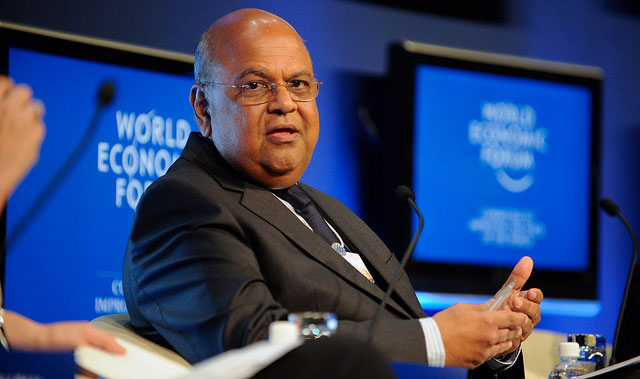
It’s South Africa’s equivalent to the proverbial $640 Pentagon toilet seat — a paper binding machine that the government buys from its suppliers for the rand equivalent of almost R28 000, about 13 times what it costs in a store.
Kenneth Brown, the nation’s 54-year-old chief procurement officer, cited the binding machine as an example of the massive waste that means as much as 40% of the government’s R600bn budget for goods and services is being consumed by inflated prices from suppliers, and fraud.
“It means without adding a cent, the government can increase its output by 30-40%,” he said in an interview in Pretoria. “We could be building more roads, more schools without even adding more money to the current budget.”
Since the office was set up in 2013, Brown and his team of 93 have led a treasury drive to contain spending and renegotiate business deals that’s taken on new urgency as South Africa faces a possible credit-rating downgrade to junk.
Finance minister Pravin Gordhan has pledged to stick to a spending cap, under pressure from the rating companies to keep debt under control and bring down a budget deficit that’s been above 3% of GDP since 2009.
How transparently the government spends its funds became a national issue after public protector Thuli Madonsela found that taxpayer money was used to pay for a R215m upgrade of President Jacob Zuma’s private home in Nkandla.
The constitutional court ruled in March that Zuma violated the law by not abiding by her recommendation that he repay some of the money, and ordered him to comply. The Special Investigating Unit, an independent agency that probes corruption in the government, found Zuma’s architect liable to repay R155m related to the alleged misuse of public funds in security upgrades.
A major problem is fraud, including collusion between business people and government officials to inflate prices, according to Brown.
“That is where the real leakage in the system actually is,” he said. “People can order things they don’t need, and they can take them home.”
Tensions between the presidency and the treasury have simmered since Zuma fired the respected Nhlanhla Nene as finance minister in December and replaced him with a little known lawmaker. After investors sold the nation’s rand and bonds and business and ruling party leaders lobbied the president to change course, he reinstated Gordhan four days later to the post of finance chief, which he had held from 2009 to 2014.
Since then, Zuma has rebuffed Gordhan’s request to fire the nation’s tax chief for insubordination and delayed his attempts to install a new board at the loss-making state airline. A special police unit known as the Hawks is investigating Gordhan over an allegedly illicit surveillance unit set up when he led the national tax agency almost a decade ago.
Gordhan, in an interview with Bloomberg TV in New York on Tuesday, called the probe “a bit of political mischief.”
The cost-cutting drive has pitted treasury against other government departments. Last month, treasury said it rejected a request from home affairs minister Malusi Gigaba for his staff to fly in business class seats and it turned down appeals from state power utility Eskom for company credit cards.
Brown has drawn criticism from politicians who are unhappy with his investigations into procurement, said Ralph Mathekga, a political analyst at the Johannesburg-based research group, Mapungubwe Institute of Strategic Reflection.
“There are a lot of ANC or ANC-aligned politicians who say Kenneth Brown’s office and the whole treasury has too much power to the point they can frustrate political decisions,” he said by phone. “It appears their work has become a nuisance to the ANC. It looks like the party is becoming indifferent towards anti-corruption.”
Former cabinet spokesman Mzwanele (Jimmy) Manyi, who has previously hit out at government critics, alleged this month in an interview with the state broadcaster, the SABC, that he sent police a dossier he received detailing large sums of money deposited into Brown’s account.
Smear campaign
The treasury responded in an e-mailed statement on Wednesday, saying it hoped the allegations weren’t part of a smear campaign against it and Brown, “who has a longstanding record of serving the public service with great dedication”.
The ANC backs institutions and officials who are fighting corruption, said the party’s spokesman, Zizi Kodwa.
Brown said the government plans to save as much as R25bn/year by modernising its supply chain.
The office has helped negotiate new contracts for the 20 000 to 30 000 cars it buys a year, getting state departments as much as 30% in discounts. It’s also concluded contracts, including a deal with Vodacom Group, which provides mobile phone and data deals to about 400 000 of the state’s 2,2m employees.
So far, the procurement office has stopped 9 000 civil servants using companies they own to try to do business with the government, according to Schalk Human, a chief director in the procurement office. That was the result of the unit putting together a “central supplier database” where 325 000 companies were listed, and owners were verified through an automated system.
Corrupt practices
Gordhan says corrupt practices invariably follow in the wake of the government’s effort to transform the economy to stem the legacy of white minority rule that ended in 1994 and build black-owned businesses.
“The flip side of this transformation, the rotten product in the gift wrap, is what is called rent-seeking,” Gordhan said in a speech in Johannesburg last month. “It means every time I want to do something, I say it is part of transformation. But in the meantime, it means giving contracts to my pals in closets.” — (c) 2016 Bloomberg LP
- Reported with assistance from Rene Vollgraaff

